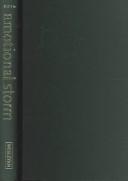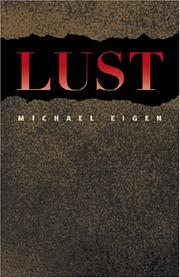| Listing 1 - 10 of 20 | << page >> |
Sort by
|
Book
ISBN: 042947637X 1280995424 9786613767035 1782410023 9781782410027 9781781810941 178181094X 9781780490809 1780490801 0429915373 Year: 2012 Publisher: London Karnac Books
Abstract | Keywords | Export | Availability | Bookmark
 Loading...
Loading...Choose an application
- Reference Manager
- EndNote
- RefWorks (Direct export to RefWorks)
Wilfred Bion once said, "I use the Kabbalah as a framework for psychoanalysis." Both are preoccupied with catastrophe and faith, infinity and intensity of experience, shatter and growth of being that supports dimensions which sensitivity opens. Both are preoccupied with ontological implications of the Unknown and the importance of emotional life. This work is a psychospiritual adventure touching the places Kabbalah and psychoanalysis give something to each other. Michael Eigen uses aspects of Bion, Winnicott, Akivah, Luria and Nachman (and many more) as colours on a palette to open realities for growth of experience. Bion called faith "the psychoanalytic attitude" and Eigen here explores creative, paradoxical, multidimensional aspects of faith. Eigen previously wrote of psychoanalysis as a form of prayer in The Psychoanalytic Mystic. In Kabbalah and Psychoanalysis he writes of creative faith. Sessions as crucibles in which diverse currents of personality mix in new ways, alchemy or soul chemistry perhaps, or simply homage to our embryonic nature which responds to the breath of feeling moment to moment.
Cabala --- Psychoanalysis. --- Psychology --- Psychology, Pathological --- Cabbala --- Jews --- Kábala --- Kabalah --- Kabbala --- Kabbalah --- Qabalah --- Jewish literature --- Magic --- Mysticism --- Psychological aspects. --- Judaism
Book
ISBN: 0429479581 1782411429 9781782411420 129966072X 9781299660724 9781781812747 1781812748 9781782200383 0429904355 0429918585 Year: 2013 Publisher: London : Karnac,
Abstract | Keywords | Export | Availability | Bookmark
 Loading...
Loading...Choose an application
- Reference Manager
- EndNote
- RefWorks (Direct export to RefWorks)
The authorrelates the stories of two patients reshaping their lives into something they could believe in, and examines the complex roles of the therapist and therapy, self/other and mind/body relations, and the dramatic interplay of faith and catastrophe.
Book
ISBN: 0429896050 0429471289 1782411879 1781813191 9781781813195 9781782411871 1782201025 9781782201021 9781306490863 1306490863 0429910282 Year: 2013 Publisher: London Karnac Books
Abstract | Keywords | Export | Availability | Bookmark
 Loading...
Loading...Choose an application
- Reference Manager
- EndNote
- RefWorks (Direct export to RefWorks)
"This book picks up where Michael Eigen's previous work, Kabbalah and Psychoanalysis, left off. It is based on two expanded transcriptions of seminars given for the New York University Postdoctoral Program Contemplative Studies Project. As noted in the previous book, W.R. Bion once said that he uses the Kabbalah as a framework for psychoanalysis. This book enlarges the inner sense of this statement. The seminars depict intricate intertwining of processes in psychoanalysis and Kabbalah, processes important in helping us live more richly. Religious language helps bring out nuances of psychological states and psychology helps make the language of the spirit more meaningful to emotional concerns today. Bion and Winnicott are the main psychoanalytic heroes of this work, each adding richness to a "root sense" out of which their clinical and written work grow. A felt sense, spans many dimensions, traversing sensory life, vital sensing, common sense, the sense of language, cultural sensing, intuition, Freud's use of consciousness as a sense organ of psychical perception, and other qualities still unknown. Case descriptions include extended work with an alcoholic man, opening new paths to living, and a detailed account of helping a creative, tormented woman die well. Aspects of psychosis, creativity, mysticism and everyday life blend and have a say. The main focus is psychic reality, with psychoanalysis and Kabbalah tools in this great enterprise of learning to work with ourselves."--Provided by publisher.
Cabala --- Psychoanalysis. --- Psychology --- Psychology, Pathological --- Cabbala --- Jews --- Kábala --- Kabalah --- Kabbala --- Kabbalah --- Qabalah --- Jewish literature --- Magic --- Mysticism --- Psychological aspects. --- Judaism
Book
ISBN: 0429474555 1782412891 1306957486 9781306957489 9781782412892 9781781814215 178181421X 9781782201540 1782201548 9780429896920 0429913559 Year: 2014 Publisher: London Karnac Books
Abstract | Keywords | Export | Availability | Bookmark
 Loading...
Loading...Choose an application
- Reference Manager
- EndNote
- RefWorks (Direct export to RefWorks)
This book explores psychoanalytic faith and, more generally, the role of faith in the therapeutic process. In his earlier work, Eigen distinguished faith from beliefs used to organize it, the latter at once bringing people together and creating violent oppositions - belief as a defense against faith. In this new work, Eigen dives into faith experience itself and shares what he finds. Faith spans many dimensions. The opening chapters focus on variations of faith, beginning with nature, sleep, beauty, goodness, the opening-closing of the human face, and the paradox of the growth of faith through pain and shattering. Accounts of faith in the author's life lead to creative readings of Winnicott followed by meditations on evil. A chapter is devoted to teaching and learning Bion, who called faith the psychoanalytic attitude (or called the psychoanalytic attitude Faith) Another chapter discusses variants of everyday mystical participation and a climactic moment in the Zohar, a principal part of the Kabbalah.
Faith and reason. --- Good and evil. --- Faith. --- Religious belief --- Theological belief --- Belief and doubt --- Religion --- Salvation --- Theological virtues --- Trust in God --- Evil --- Wickedness --- Ethics --- Philosophy --- Polarity --- Religious thought --- Faith and logic --- Logic and faith --- Reason --- Reason and faith --- Reason and religion --- Religion and reason --- Religious aspects
Book
ISBN: 0429905955 0429481187 1782412425 9781782412427 130684083X 9781306840835 178220153X 9781782201533 9781781813744 1781813744 9781782201533 0429920180 9780429920189 9780429905957 9780429481185 Year: 2014 Publisher: London Karnac Books
Abstract | Keywords | Export | Availability | Bookmark
 Loading...
Loading...Choose an application
- Reference Manager
- EndNote
- RefWorks (Direct export to RefWorks)
"The birth of experience goes on all life long. Giving birth to oneself involves many processes. The first chapter of this book expands on Eigen's final talk on "Psychoanalysis and Kabbalah" for the New York University Postdoctoral Contemplative Studies Project, and focuses in particular on an intertwining of beauty and destruction. Beauty is the heart of the Kabbalistic Tree of Life, intricately linked both to other capacities and to catastrophic devastation. Interestingly, Bion also links faith and catastrophe, and writes of psychoanalytic "beauty", thereby creating a rich dance of psychoanalysis with Kabbalah. Winnicott adds his own special touch, associating the fate of a vital spark with trauma as the personality begins to form, and with the work of spontaneous recovery that is a profound part both of living and of therapy sessions. The second part of the book is new and focuses on birth processes at different ages and situations, exploring in detail how psychoanalysis interweaves with themes from life, clinical work, and Kabbalah. Failed birth processes are part of living but so is the need to "midwife" existence. Eigen suggests that there may be some kind of "organ" that permeates, scans, and tastes shifting centers of experience, taking note of their fate and partnering their development - a kind of inner tuning sense in search of cultivation, spanning what we call conscious and unconscious life, mind and body, and testing the weather for favorable birth conditions. Often we do not know exactly what is happening or how, but sense something germinating. Domains open that are not confineable or restricted by the tools at hand - which is perhaps one reason why analysts are called toolmakers, as experience and the tools used to understand it become part of further birth processes. In this way, Eigen shows how the intimate fusion of psychological and spiritual currents generate new tastes of living."--Provided by publisher.
Book
ISBN: 042990052X 0429475756 1782414665 9781782414667 9781782203728 1782203729 1781815984 9780429475757 042991475X 9781781815984 Year: 2016 Publisher: London
Abstract | Keywords | Export | Availability | Bookmark
 Loading...
Loading...Choose an application
- Reference Manager
- EndNote
- RefWorks (Direct export to RefWorks)
"Image and sensing have been underrated in Western thought but have come into their own since the Romantic movement and have always been valued by poets and mystics. Images come in all shapes and sizes and give expression to our felt sense of life. We say we are made in the image of God, yet God has no image. What kind of image do we mean? An impalpable image carrying impalpable sense? An ineffable sense permeates and takes us beyond the five senses, creating infinities within everyday life. Some people report experiencing colour and sound when they write or hear words. Sensing mediates the feel of life, often giving birth to image. In this compelling book, Michael Eigen leads us through an array of images and sensing in many dimensions of experience, beginning with a sense of being born all through life, psychosis, mystical moments, the body, the pregnancy of "no", shame, his session with Andre Green, and his thoughts related to James Grotstein, Wilfred Bion, and Marion Milner. The author concludes with notes on his life as a young man leading him into the therapeutic vocation he has fostered and which has fostered him for nearly sixty years."--Provided by publisher.
Psychoanalysis. --- Psychology --- Psychology, Pathological --- Freud, Sigmund, --- Freud, Sigmund

ISBN: 9780819567536 0819567531 Year: 2005 Publisher: Middletown (Conn.): Wesleyan University press,
Abstract | Keywords | Export | Availability | Bookmark
 Loading...
Loading...Choose an application
- Reference Manager
- EndNote
- RefWorks (Direct export to RefWorks)
Emotions. --- Psychoanalysis --- Psychotherapy --- Psychoanalytic interpretation.

ISBN: 0819568082 0819568090 Year: 2006 Publisher: Middletown (Conn.) : Wesleyan university press,
Abstract | Keywords | Export | Availability | Bookmark
 Loading...
Loading...Choose an application
- Reference Manager
- EndNote
- RefWorks (Direct export to RefWorks)
Book
ISBN: 0429923120 042990889X 0429484127 1283125390 9786613125392 1849402671 Year: 2018 Publisher: Boca Raton, FL : Routledge, an imprint of Taylor and Francis,
Abstract | Keywords | Export | Availability | Bookmark
 Loading...
Loading...Choose an application
- Reference Manager
- EndNote
- RefWorks (Direct export to RefWorks)
A profound look at the origins of patient's maladies and the way they lead their lives. The author describes the analyses leading to de-programming these patients from their toxins and intoxicators. The spirits of Bion, Winnicott, and Lacan grace the text.
Book
ISBN: 0429913109 0429898878 0429474105 1282900900 9786612900907 1849407398 9781849407397 9781282900905 6612900903 9780429898877 9780429474101 9781855758193 1855758199 Year: 2010 Publisher: London : Karnac,
Abstract | Keywords | Export | Availability | Bookmark
 Loading...
Loading...Choose an application
- Reference Manager
- EndNote
- RefWorks (Direct export to RefWorks)
This book contains an eighteen hour seminar - given over a three day period - presented by Michael Eigen in Seoul, Korea, in 2007. The seminar traces transformations of madness and faith in psychoanalysis - particularly Freud, Klein, Bion and Winnicott - emphasizing basic rhythms of experience steeped in clinical details, social issues and personal concerns, and takes up problems of madness and faith besetting the world today. It is filled with clinical portrayals and discussions of personal and social issues. Eigen describes ways we live through challenging experiences in therapy relevant for how life is lived. Discussions go back and forth between clinical details and cultural dilemmas, touching the taste of life, how one feels to oneself. This work is at once personal, learned, and down-to-earth. One gets the feeling that a lifetime of dedicated work is being condensed and transmitted, mind to mind, person to person, soul to soul. The reader will feel he or she is a member of an ongoing seminar alive today, this moment, carrying the work further.
| Listing 1 - 10 of 20 | << page >> |
Sort by
|

 Search
Search Feedback
Feedback About UniCat
About UniCat  Help
Help News
News